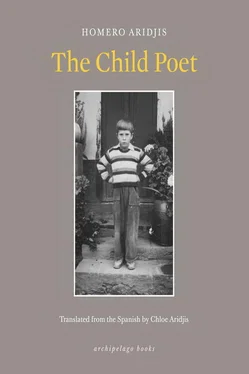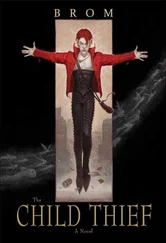Outside the door, my mother talked about me with a nun. In a room off the corridor another nun prepared my brother for his meeting.
Father Felipe seemed to be and not be at my side, and in order to finish coming nearer or going, he would half close his eyes.
I searched for a wish within me, something I could ask for and have come true.
But I couldn’t find any, as I was happy without them.
And then he opened his eyes, smiled, and asked me to fetch my brother.
The following day we took Communion; the burning candles made me dizzy during Mass.
Afterwards we had breakfast in the convent’s dining room with the two nuns who had readied us for our Communion. These women spent the entire time discussing Father Felipe’s physical condition with my mother while consuming multiple helpings of jello and cake and several mugs of hot chocolate.
“His teeth often bother him when he eats,” they said, “if the meat is tough or the bread is stale.”
“Whenever he works too hard he gets tired, and has trouble hearing and mumbles his words.”
“If he doesn’t sleep enough the weather really affects him, his bones ache and he gets the shivers.”
“When he walks he has to go slowly and put his foot down firmly; a false step might cost him his life.”
After breakfast we returned to Contepec. That morning thousands of monarch butterflies were crossing the village. The air, like a river, bore currents of butterflies.
Through the streets, above the houses, between the trees and people, they made their way south.
In a room without a door in the backyard my dog lay dying.
The day before, while we were in Temascalcingo, he had gone out alone into the street and someone had given him yerba.
Lying on the floor, between convulsions and frothing, he was slowly claimed by death.
In vain my parents tried to save him. My mother asked the maids if it hadn’t been the butcher, who for some reason resented my father and had wanted to take revenge.
Rintintin no longer recognized me; futilely, I called out his name. He had been dragged away by death, and his days now seemed unreal and his existence foreign to mine.
Tomorrow, I told myself, he will be dead, and they’ll throw him to the outskirts of the village, where he’ll be fodder for the vultures.
On Sundays the peasants from the farms wandered our village drunk. They crawled on all fours over the cobblestones, or hugged the walls to get around.
After going to Mass and doing their shopping, they headed for the cantinas or drank pulque in the market.
Some would stagger past my father’s store, stopping at the lamppost to regain their balance and avoid falling “snout first,” as they said.
In the square an old man peed in front of his daughters, while the sun set in the distance over his back.
A few steps away a youth was being dragged by a horse that barely moved, and the boy spoke calmly to passersby from the ground.
In the store a woman was trying to say something to my father but couldn’t get the words out because her tongue was thickened from drinking. Faced with her incoherence my father attended to other customers, and the woman stumbled out snorting.
Outside the cantina an old man and a young man threw punches at each other, surrounded by an audience of men, women, children, and other drunks who’d just emerged from other cantinas.
A while after the tongue-tied woman had left the store my brother and Ricardo el Negro found her sprawled near an unwalled well on their way to the playing field. She lay sleeping on her back, her arms and legs splayed wide, her woven dress hiked up above her navel. She wasn’t wearing any underwear, exposing her dust-covered genitals.
My brother and Ricardo el Negro placed withered flowers on her forehead and in her mouth and bottles between the fingers of both hands. Then they shook an empty flour sack over her body and turned her white. Their guffawing woke her up and they broke into a run, pursued by the woman’s loud curses.
In our garden at dusk, amid the plants, my cousin and her friends, in colorful dresses and with their parents’ features pasted on their faces, were pretending to prepare supper.
Coriander, parsley, and watercress lay on the plates; candy and tangerines in the fruit bowl.
With a blue bucket on her head, my cousin, looking like a dunce and brandishing a bunch of spearmint, gave her two friends a lesson on how to brew tea, while they sat by her side with open legs. Catching me watching, they called out for me to join them, so I could play the husband who returns home.
But I didn’t care to.
So my cousin came over to me and stuck her hands in my pockets, feeling around to see whether I had any chocolates or pesos on me, although before long she unzipped my fly. And rolling her eyes towards the bathroom, she led me with murmurs to “you know where, to do what you like to do.”
Leaning against the wall she lifted her dress and made me run my hand across her bare stomach, sliding it down until she clamped it in her fissure.
A few weeks later as I played with soldiers in my room I had the urge to pee. On my way down the corridor I realized I was alone in the house, and sensed a presence around me that froze my steps and kept me from moving.
The sky was darkening, the walls and the floor had a muddy hue, and my parents’ room, seen through the window, had been emptied of its furniture; I felt like someone who returns home after many years and the loved ones he expects to find have already died or gone away, and the house to which he returns has undergone so much change that, although he’s in it, he feels he is elsewhere.
And so, as in one of those dream scenarios in which the participants are dead, the setting is antiquated, the air that envelops us is phantasmal, and the seconds we live through make us feel so unhappy in that space that they seem longer than they really are, I walked without walking, spoke without speaking.
And with my body stilled and my self troubled, I tried to move my tongue in an “Our Father who art in heaven, ha, ha, ha …,” but I couldn’t pronounce “hallowed” until I drew out from within me an enormous, magical
HA
that stood for “HHHHHHHHHAAAAAAAAALLLLLLLLLOWED.”
And once I said it I could move again, and I ran out of the house in terror.
Upon waking the following day at midnight I saw a ghastly woman at the window of my room.
Disheveled, she cried silently, her half-parted lips fogging up the glass panes. Her features were those of the drunken lady, the one my brother and Ricardo el Negro had made mischief with, and those of a young prostitute who had been raped and killed by a madman. This young woman had gone to Mexico City and lived in a brothel. The madman, who happened to be her cousin, had fallen in love with her when she returned to the village. One afternoon he attacked her in the kitchen, and thinking he was embracing her, hugged pots, brooms, and chairs, sating himself with them. One night, however, he pierced her throat with a knife.
Mute words and thwarted groans seemed to emerge from the hole in her neck. Her breasts were like the heads of pigeons and turtledoves.
“Don’t believe in her,” I told myself, “because you’ll keep seeing her. Look, she doesn’t exist.”
And I dropped my eyelids so as not to see her. And I tried to wake up, though I was already awake.
And when I opened my eyes to see whether she had gone, she was still there, watching me now with the face of my aunt Inés, who would visit me at the clinic after I was born. As a two-months-early baby I was put in a glass box and Inés would press her nose to the glass to gaze at me.
The light in her eyes was beautiful, passing through the window’s dirty panes unmuddied, and an internal brightness made her face radiant.
Читать дальше












